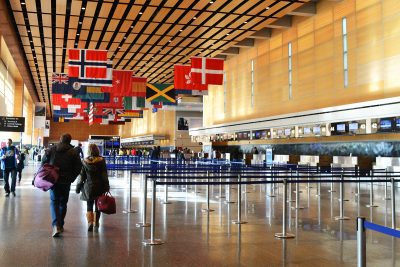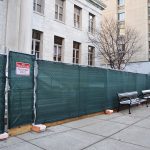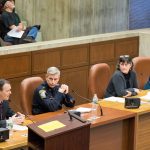
Massachusetts congressional delegation members and state representatives signed a letter on Wednesday, calling on Boston Logan International Airport customs officials to comply with the temporary restraining order placed on President Donald Trump’s recent executive order on immigration, according to a press release issued by Massachusetts Sen. Ed Markey’s office.
Massachusetts Sen. Edward Markey and Rep. William Keating led the 11 members of the delegation in calling on Clint Lamm, Boston area port director for U.S. Customs and Border Protection, to comply with the restraining order, according to the release.
Keating, who represents District 9, said in a statement emailed to The Daily Free Press that the executive orders have both harmed American ideals and left the nation more vulnerable to the threat of terrorism.
“I felt it my responsibility to urge our federal border officials to comply with the restraining order issued by a federal court in Boston,” Keating said in the statement. “The independence of the courts and adherence to the rule of law is fundamental to the system of checks and balances in this country, and attempts to undermine court orders undermines that core tenet of our democracy.”
The delegation will continue to fight back against the president’s executive order in the weeks and months ahead, Rep. Joe Kennedy III, who represents District 4, said in a statement emailed to The Daily Free Press.
“When we unilaterally close our doors to immigrants and refugees, we become a government guided by fear rather than strength,” Kennedy said in the statement. “True to our inclusive, tolerant beliefs, our Commonwealth kept Logan’s runways open and welcomed those fleeing persecution and violence.”
Rep. Niki Tsongas, who represents District 3, referred to the orders as “distinctly un-American” in a statement emailed to The Daily Free Press.
“Massachusetts and the Third District in particular, have a long, proud tradition of embracing diversity and welcoming immigrants from across the globe,” Tsongas said in the statement. “President Trump’s Muslim and refugee ban is an affront to our core values here and across the United States and it could have serious consequences for our economy, world standing and national security.”
Westy Egmont, the director of Boston College’s Immigrant Integration Lab, said at its strongest, the congressional delegation should “[respond] forcibly to matters of public interest.”
“If our elected officials in a democracy do not speak out, who will?” Egmont said. “When the populace is speaking, the officials even more so should reflect the will of the people and the debate among the people of the democracy to express their opinions and express them vociferously.”
Egmont said the most recent legal decision on the executive orders, issued by a Seattle federal court on Feb. 4, will protect immigrants with valid paperwork, but not necessarily those who have lost their visas as a result of the travel ban.
“This has been an exceptional story on many levels, and in many aspects it’s without clear precedent,” Egmont said. “I think it will be a developing story still as we see how [the State Department] responds to the people who have lost their visas and whether they are reissued.”
Sarah Sherman-Stokes, a clinical instructor at the Immigrants’ Rights Clinic in Boston University’s School of Law, said despite the Seattle court’s successful block of the executive orders, it is likely this case will reach the Supreme Court.
“When it comes to issues of immigration, the executive branch has typically had a great deal of authority,” Sherman-Stokes said. “The question is, when there are potential violations of due process … [and] if there are constitutional violations, then does the scope and degree of authority change?”
Sherman-Stokes spent time at Logan Airport last week supporting legal efforts to enforce compliance with the temporary restraining order, and said Customs and Border Protection seemed to be doing “a pretty good job.”
“Unfortunately, the immigration laws have been strict in a lot of their discretion, and so in cases even for people who are long-term green card holders, if they have run afoul of the law in any way … then their options for release or to defend against their deportation are very limited,” Sherman-Stokes said.
Several Boston residents expressed support for the Massachusetts congressional delegation’s response to the orders.
Whitney Young, 27, of South Boston, said America is founded on immigration.
“My parents came over from Italy, so I think it’s insane to think that blocking people from entering is going to fix anything,” Young said. “Especially since our state voted democratic, I think we owe it to everyone in the state that voted that way to fight some of these things.”
William Tinsley, 57, of Back Bay, said he does not support the orders or Trump’s presidency.
“I feel there’s been not enough [backlash],” Tinsley said. “[I would like to see] Donald Trump impeached.”
Bridget DeBose, 48, of Downtown, said Massachusetts is a place of “patriotic activity” and lawmakers in the state should speak out against the orders.
“We should never be allowed to practice discrimination by placing Muslims on a list,” DeBose said. “We’re going back in time instead of moving forward and being progressive.”



